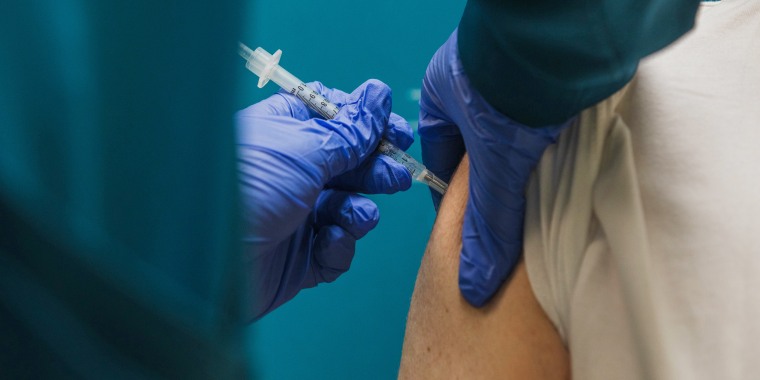There’s a great sense of relief for many people now that the COVID-19 vaccine is being rolled out and offering hope that life will return to normal.
Still, the coronavirus epidemic is far from over and public health experts are weary of what might happen next.
Dr. Marissa Levine, director of the Center for Leadership in Public Health Practice at the University of South Florida in Tampa, has been concerned people will start taking fewer precautions now that the vaccine is here.
“I've been worried about that all along because quite frankly, we've seen people letting their guard down at many steps along the way,” Levine told TODAY.
“Any thought that, ‘The vaccine is here. Now we don't have to worry, now we don't have to do anything more to protect ourselves,’ is very concerning because we're still in an upward trend of diseases, hospitalizations and deaths pretty much all throughout the country.”
Here are five concerns that linger:
People won’t go back for the second shot.
Both the Pfizer-BioNTech and Moderna vaccines require two doses that should be taken a few weeks apart — at least 21 days in the case of Pfizer and at least 28 days for Moderna. Both vaccines are about 95% effective at preventing symptomatic COVID-19 after the second dose.
The first shot starts building immunity, while the second is needed to get the most protection the vaccine has to offer, the Centers for Disease Control and Prevention noted.
Don’t think you’re home free after a single dose: It's just partial protection and doctors aren’t sure how long it will last, said NBC News medical correspondent Dr. John Torres.
“The evidence is based on two doses of the vaccine. So if you don't get two doses, I think all bets are off,” Levine said, cautioning people not to over-interpret early data that showed some benefits after the first shot.
“I hope people will understand that the studies with high efficacy were done with two shots. Most vaccines require two shots,” added Dr. Larry Corey, a virologist and professor in the vaccine and infectious disease division at the Fred Hutchinson Cancer Research Center in Seattle.
“The closer you stay to that regimen, the more likely you are to get a great result.”
People who get vaccinated think they’re immediately protected.
The first dose of the Pfizer vaccine provides some protection about a week later, data shows.
But it’ll take about a month after the first shot of the two-dose regimen at the earliest to have what’s considered a full antibody response, Levine said.
It’s possible for a person to be infected with the coronavirus just after vaccination and still get sick because the vaccine didn’t have enough time to provide protection, the CDC cautioned.
People who are vaccinated will stop wearing masks and social distancing.
Americans who’ve had two doses of the vaccine may be protected from becoming sick — but could they still spread the virus to others?
“We have to assume that you still could do that,” Corey said.
While doctors don’t have a definitive answer right now, there is hopeful evidence suggesting just one dose of Moderna's vaccine may stop the spread. Documents published by the FDA found asymptomatic infection was reduced by 63% after the first shot, NBC News reported.
Until more is known, it's important for people who get vaccinated to continue social distancing and wearing face coverings.
“You'll see health care workers who are vaccinated are still going to wear full personal protective equipment,” Levine said.
People who haven't been vaccinated will become complacent.
There’s concern Americans will watch others get the vaccine, skip the shot themselves and assume they won’t get sick because other people are protected.
They’ll feel better about going out without masks and gathering, thinking herd immunity is near when in fact cases are still on the rise.
“That's false assurance there, so that would be very concerning … this is not the time to let our guard down,” Levine said.
“We're all tired of this, but we really need to continue all of these measures until we have probably well over 70% of our population demonstrating immunity.”
People will ‘wait’ to get the shot.
The latest Gallup poll shows 63% of Americans are willing to get the COVID-19 vaccine.
That still leaves more than a third of the population vowing to either never get the shot or delaying their opportunity to be vaccinated when it becomes available — impacting herd immunity.
“I think all reasonable people — if they had the chance to put the noise aside and disregard all those terrible conspiracy theories — would look at this and say: I want this for my family, I want it for myself,” Dr. Francis Collins, the director of the National Institutes of Health, said Sunday on NBC’s “Meet the Press.”
“People are dying right now; how could you possibly say 'let’s wait and see,' if that might mean some terrible tragedy is going to befall?”
Experts believe herd immunity could be reached by June, but if not enough people get the vaccine, the epidemic “could go on and on and on,” he warned.



